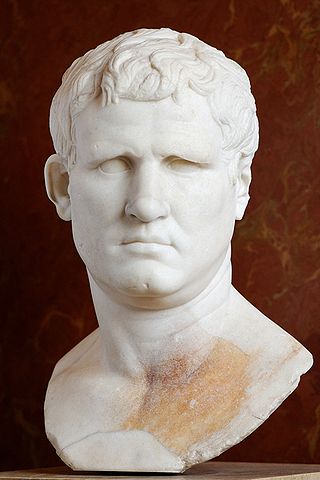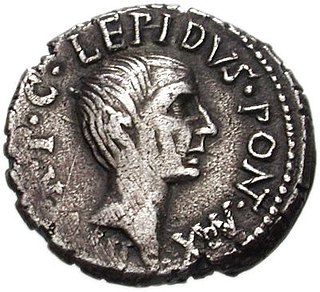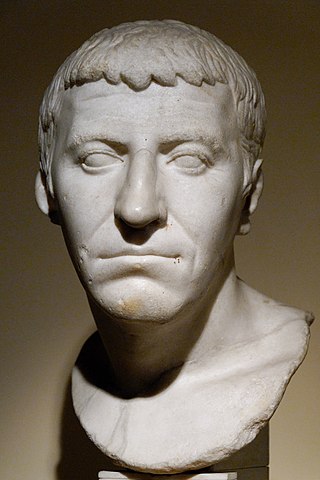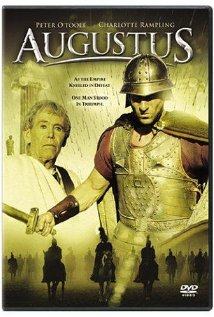Plot
Camane, a Vestal Virgin, is the only one of her order to see visions of the future. Desperate to avoid the carnage she foresees, Camane sneaks out of the temple to warn Julius Caesar, his sister Atia, and nephew Octavius. Ignoring Atia and Octavius's pleas to heed the warning, Caesar returns to the Senate, and is murdered by the senators, who fear his increasing power and popularity amongst the citizens of Rome. In the process, the conspirators lose the support of Mark Antony, who is appalled at their treachery. The assassination attempt succeeds because Tyrannus, a former gladiator who serves as Caesar's bodyguard, was distracted by the kidnapping of his young son, Piso, by a group of hired assassins. Tyrannus manages to rescue Piso but returns to a fatally wounded Caesar, who lives long enough to tell him that Octavius is his chosen successor and orders Tyrannus to protect him.
Tyrannus sends his wife and son away and then leaves Rome with Octavius to protect him from assassination. Outside Rome they begin to seek allies who are willing to overthrow the senate. To Octavius, Mark Antony appears a willing and eager supporter of his cause and the two quickly become close allies. Antony verbally agrees to join Octavius and even signs a document stating that Octavius has the support of his troops should he die; Octavius makes the naïve mistake of offering Antony leadership if he himself should perish. It is after this agreement that Antony's true intentions are made known when he attempts to have Octavius killed. Antony almost succeeds but the weak and poisoned Octavius is saved by a young Marcus Agrippa. Camane, having seen the danger in her visions, arrives and saves Octavius' life by getting the poison out of him. It is then revealed that Camane has fallen in love with Octavius through her visions.
Once recovered, Octavius, Agrippa, and a few companions make for Gaul, where Octavius aims to enlist the help of his uncle's former Legio III Gallica (Third Legion). According to the story, the Third Legion was disgraced in battle and Julius Caesar had one in every ten men killed (decimation). The survivors have remained in the Italian hinterlands ever since, living as bandits and are known as the Lost Legion. At first these men want to avenge themselves by killing Octavius but Octavius manages to win their support with the help of Cicero.
Tyrannus' wife has died and Piso has been adopted by a noble family on the island to which they fled. Thinking Octavius dead and desiring to be able to afford the opportunity to raise his son, Tyrannus joins with Mark Antony as a centurion. As a centurion Tyrannus has the means to educate and raise his son as a nobleman but finds the soldiers under his command to be suspicious of him and upset at being subordinate to this low-born gladiator. After he saves one of his men from being killed, an act that nearly costs him his life, Tyrannus earns the respect of his men. Mark Antony, having allied himself with the Senate, hears of Octavius's survival and moves quickly to intercept him before he can gain too large a following. Antony's army is superior in size to that of Octavius, and it includes the men under command of Tyrannus.
In the ensuing battle, Octavius rallies his troops, despite being outnumbered. They begin to lose ground and Antony appears to have won. At that moment Tyrannus and his men change sides and turn the tide of battle. As the conflict closes Mark Antony is disarmed but Octavius shows him mercy. For her assistance, Octavius appoints Camane matriarch of the order of Vesta, and she cries as she realized that she shall never be with him. Octavius appears unmoved. The saddened Camane relates that Tyrannus vanished from the pages of history, having given up a life of renewed glory at Octavius's side to raise Piso and live a normal life.

Gaius Julius Caesar Augustus, also known as Octavian, was the founder of the Roman Empire. He reigned as the first Roman emperor from 27 BC until his death in AD 14. The reign of Augustus initiated an imperial cult, as well as an era associated with imperial peace in which the Roman world was largely free of armed conflict. The Principate system of government was established during his reign and lasted until the Crisis of the Third Century.

Marcus Vipsanius Agrippa was a Roman general, statesman and architect who was a close friend, son-in-law and lieutenant to the Roman emperor Augustus. Agrippa is well known for his important military victories, notably the Battle of Actium in 31 BC against the forces of Mark Antony and Cleopatra. He was also responsible for the construction of some of the most notable buildings of his era, including the original Pantheon.

Marcus Antonius, commonly known in English as Mark Antony, was a Roman politician and general who played a critical role in the transformation of the Roman Republic from a constitutional republic into the autocratic Roman Empire.
Year 43 BC was either a common year starting on Sunday, Monday or Tuesday or a leap year starting on Sunday or Monday of the Julian calendar and a common year starting on Monday of the Proleptic Julian calendar. At the time, it was known as the Year of the Consulship of Pansa and Hirtius. The denomination 43 BC for this year has been used since the early medieval period, when the Anno Domini calendar era became the prevalent method in Europe for naming years.

Year 44 BC was either a common year starting on Sunday, common year starting on Monday, leap year starting on Friday, or leap year starting on Saturday. and a common year starting on Sunday of the Proleptic Julian calendar. At the time, it was known as the Year of the Consulship of Julius Caesar V and Marc Antony. The denomination 44 BC for this year has been used since the early medieval period, when the Anno Domini calendar era became the prevalent method in Europe for naming years.

This article concerns the period 49 BC – 40 BC.

The Second Triumvirate was an extraordinary commission and magistracy created for Mark Antony, Lepidus, and Octavian to give them practically absolute power. It was formally constituted by law on 27 November 43 BC with a term of five years; it was renewed in 37 BC for another five years before expiring in 32 BC. Constituted by the lex Titia, the triumvirs were given broad powers to make or repeal legislation, issue judicial punishments without due process or right of appeal, and appoint all other magistrates. The triumvirs also split the Roman world into three sets of provinces.

Marcus Aemilius Lepidus was a Roman general and statesman who formed the Second Triumvirate alongside Octavian and Mark Antony during the final years of the Roman Republic. Lepidus had previously been a close ally of Julius Caesar. He was also the last pontifex maximus before the Roman Empire, and (presumably) the last interrex and magister equitum to hold military command.

Gaius Cassius Longinus was a Roman senator and general best known as a leading instigator of the plot to assassinate Julius Caesar on 15 March 44 BC. He was the brother-in-law of Brutus, another leader of the conspiracy. He commanded troops with Brutus during the Battle of Philippi against the combined forces of Mark Antony and Octavian, Caesar's former supporters, and committed suicide after being defeated by Mark Antony.

Sextus Pompeius Magnus Pius, also known in English as Sextus Pompey, was a Roman military leader who, throughout his life, upheld the cause of his father, Pompey the Great, against Julius Caesar and his supporters during the last civil wars of the Roman Republic.
Decimus Junius Brutus Albinus was a Roman general and politician of the late republican period and one of the leading instigators of Julius Caesar's assassination. He had previously been an important supporter of Caesar in the Gallic Wars and in the civil war against Pompey. Decimus Brutus is often confused with his distant cousin and fellow conspirator, Marcus Junius Brutus.

The Battle of Forum Gallorum was fought on 14 April 43 BC between the forces of Mark Antony and legions loyal to the Roman Senate under the overall command of Consul Gaius Pansa, aided by his fellow consul Aulus Hirtius. The untested Caesar Octavian guarded the Senate's camp. The battle occurred on the Via Aemilia near a village in northern Italy, perhaps near modern-day Castelfranco Emilia.

The Battle of Mutina took place on 21 April 43 BC between the forces loyal to the Senate under Consuls Gaius Vibius Pansa and Aulus Hirtius, supported by the forces of Caesar Octavian, and the forces of Mark Antony which were besieging the troops of Decimus Brutus. The latter, one of Caesar's assassins, held the city of Mutina in Cisalpine Gaul.

Imperium: Augustus is a 2003 joint British-Italian production, and part of the Imperium series. It tells of the life story of Octavian and how he became Augustus. Half the film takes place in the past and the other half takes place in the later life of Augustus.

Cleopatra is a 1999 miniseries adaptation of Margaret George's 1997 historical fiction novel The Memoirs of Cleopatra. Produced by Hallmark Entertainment, it stars Leonor Varela as the Egyptian queen Cleopatra, Timothy Dalton as Julius Caesar, Billy Zane as Mark Antony, Rupert Graves as Octavius, Sean Pertwee as Brutus and Bruce Payne as Cassius. Cleopatra was shown first on the ABC television network in two parts on two consecutive evenings in May 1999 and then released on videotape and DVD. Judy Farr, Martin Hitchcock and Frank Walsh were nominated for an Emmy in 1999 for outstanding art direction for a miniseries or a movie for their work on Cleopatra.

The October Horse is the sixth novel in Colleen McCullough's Masters of Rome series.

The early life of Augustus, the first Roman Emperor, began at his birth in Rome on September 23, 63 BC, and is considered to have ended around the assassination of Dictator Julius Caesar, Augustus' great-uncle and adoptive father, on 15 March 44 BC.

The Philippics are a series of 14 speeches composed by Cicero in 44 and 43 BC, condemning Mark Antony. Cicero likened these speeches to those of Demosthenes against Philip II of Macedon; both Demosthenes' and Cicero's speeches became known as Philippics. Cicero's Second Philippic is styled after Demosthenes' On the Crown.
Imperium: The Cicero Plays is a stage adaptation of the Cicero trilogy of novels by Robert Harris. It was premiered by the Royal Shakespeare Company at the Swan Theatre in Stratford-upon-Avon from 16 November 2017 to 10 February 2018, directed by Gregory Doran and with Richard McCabe as Cicero. It played at the Gielgud Theatre in London from 14 June to 8 September 2018.
The War of Mutina was a civil war between the Roman Senate and Mark Antony in Northern Italy. It was the first civil war after the assassination of Julius Caesar. The main issue of the war were attempts by the Senate to resist Antony's forceful assumption of the strategically important provinces of Transalpine and Cisalpine Gaul from their governors. The Senate, led by Cicero and the consuls, attempted to woo Julius Caesar's heir to fight against Antony. Octavian, however, would pursue his own agenda.
















